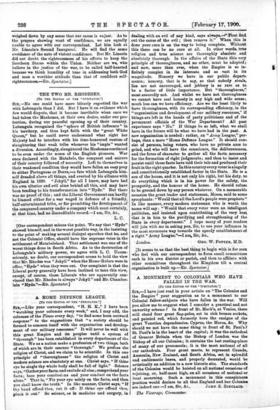THE TWO MR. RHODESES.
[To THE EDITOR OF THE " SPECTATOR.") SIR,—No one could have more bitterly regretted the war with Lobengula than I did. But I have it on evidence which few would dispute, that it became inevitable when once we had taken the Mashonas, at their own desire, under our pro- tection, during our peaceful opening up of their country. Lobengula recognised the "sphere of British influence" in his territory, and thus kept faith with the "great White Queen," but he could never understand what right her Majesty had to interfere with his time-honoured custom of slaughtering that weak tribe whenever his "impis" wanted a diversion. Accordingly, slaughtered the Mashonas continued to be even under the noses of the English pioneers. War once declared with the Matabele, the conquest and seizure of their country followed of necessity. Left to themselves in their weakened condition they would have fallen an easy prey to either Portuguese or Boers,—a fate which Lobengula him. self dreaded above all things, and averted by his alliance with England in 1S89. " Jekyll," for all I know, may have had his own ulterior and evil aims behind all this, and may have been tending to his transformation into "Hyde." But there was no proof of this ; and the Liberal Government can hardly be blamed either for a war waged in defence of a friendly, half-exterminated tribe, or for permitting the development of the conquered country under a company which most certainly, at that time, had no discreditable record.—I am, Sir, &c.,
L. C.
[Our correspondent misses the point. We say that "Hyde" showed himself, and in the worst possible way, in the insisting to the point of making several disloyal speeches that he, and not the Colonial Office, should have the supreme voice in the settlement of Matabeleland. That settlement was one of the worst things done in South Africa. As to the destruction of Lobengula's military power, we agree with L. C. Uncon- sciously, no doubt, our correspondent seems to hold the view that Mr. Rhodes was " Jekyll " when the Home-Rulers were in office, "Hyde" when they were out. Oar complaint is that the Liberal party generally have been inclined to take this view, except, of course, those Liberals who are apparently con- vinced that Mr. Rhodes is always " Jekyll " and Mr. Chamber. lain "Hyde."—En. Spectator.]






































 Previous page
Previous page